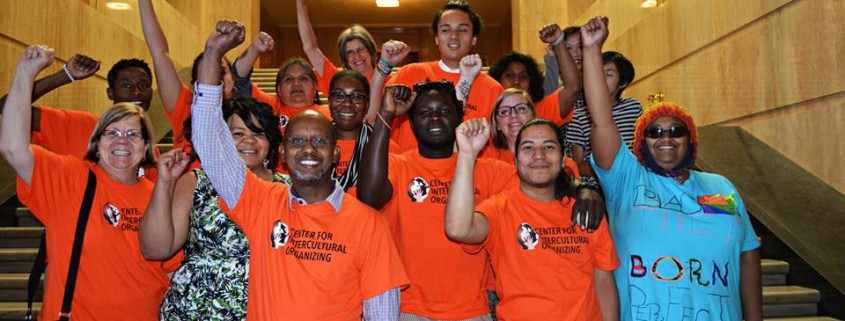The Alliance and our affiliates Center for Intercultural Organizing and Oregon Action have been organizing to put an end to racial profiling in Oregon for a decade. The first week of July, 2015, those years of organizing paid off when the Oregon Senate passed HB 2002 – a comprehensive anti-profiling bill – and sent it to the governor’s desk for her signature.
The work that built toward this victory traces back to 2006, when OA, CIO and the Alliance partnered with the Northwest Constitutional Rights Center and the Portland Police Bureau to organize a groundbreaking series of community listening sessions across Portland that brought together community members and Portland police officers for real dialogues on the issue of racial profiling.
After those sessions, the Alliance co-authored a report, Listening Sessions Report: A Community and Police Partnership to Eliminate Racial Profiling (PDF), that documented the problem and offered concrete recommendations for eliminating profiling in Portland.
But that was only the beginning of this work. In the years since, CIO and OA have continued to organize around profiling issues – collecting stories from community members who have faced profiling, making the connections between police profiling and discriminatory “ICE holds” (when immigrants are held in local jails after their charges are cleared at the behest of Immigration and Customs Enforcement), building coalition relationships, engaging in dialogues with law enforcement associations, and mobilizing grassroots supporters to build momentum for change.
The passage of HB 2002 last week represents a landmark victory in this long fight to end profiling.
HB 2002 provides a clear definition of profiling and requires all law enforcement agencies in the state to ban it. The definition encompasses profiling based on race, ethnicity, skin color, national origin, language, gender, gender identity, sexual orientation, religion, political affiliation, homelessness, and disability – a comprehensive definition that can serve as a model for other states.
HB 2002 also establishes a process for accepting and addressing complaints about profiling and includes provisions for the collection and analysis of complaint data – critical handles for enforcing the profiling ban.
While we celebrate this win with our Oregon affiliates and partners, we’re already looking ahead to what’s next: more boots-on-the-ground work to make sure the new law is fully and fairly implemented.
Here’s what Kayse Jama, Executive Director of CIO, had to say: “By defining profiling and establishing a consistent process for recording complaints, we can help build trust between law enforcement and the communities they serve. This legislation is an important step toward ending a systemic problem, but it does not mean our work is done. Actual change has to be felt on the ground.”
